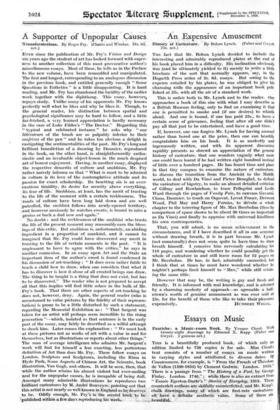An Expensive Amusement
THE fact that Mr. Bohun Lynch decided to include the interesting and admirably reproduced plates at the end of his book placed him in a difficulty. His inclination obviously was (and he ultimately yielded to it) merely to write a little brochure of the sort that normally appears, say, in the Hogarth Press series of 2s. 6d. essays. But owing to the expense entailed by his plates, he was obliged to give his charming trifle the appearance of an important book pub• lished at 25s. with all the air of a standard work.
This is unfair both to Mr., Lynch and to the reader. One approaches a book of this size with what I may describe as a British Museum feeling, only to find on examining it that one is permitted to smoke and (if one desires) to whistle aloud. And one is bound, if one has paid 25s., to have a certain sense of grievance, feeling that after all one didn't pay all that just to be entertained, and have a good time.'
If, however, one can forgive Mr. Lynch for having amused rather than bored one at the price, then one can heartily congratulate him on his book. It is so modestly and ingenuously written, and with its apparent discursive rapidity presents so shrewd an appreciation of the general history of caricature, that one wonders vaguely what more one could have learnt if he had written eight hundred instead of little over a hundred pages. He has found time and place in that tiny compass to examine the nature of caricature, to discuss the transition froin the Ancient to the Middle world, to deal with Da Vinci and Pieter Brueghel, to defend the caricature of bigotry, to make an almost detailed criticism of Gillray and Rowlandson, to trace - Pellegrini and Leslie Ward through the pages of Vanity Fair, to canvass Gavariai, Cham, Daumier, to touch on Ospovat, Lovat Fraser, Derwent Wood, Phil May and Harry Furniss, to &Vote. a whole chapter to the towering figure of Mr. Max Beerbohm (thus by comparison of space shown to be about 30 times as importatt as Da Vinci) and finally to appraise with universal kindliness
his own contemporaries. - -
That, you will admit, is no mean achievement in the circumstances, and if I have described it all in- one sentence without drawing breath, it is in part because Mi. Lynch (not unnaturally) does not seem quite to have,time to draw breath himself. I conceive him nervously calculating his 116 pages, and wondering whether he could possibly get the whole of caricature in and still leave room for 12 pages on Mr. Beerbohm. He has, in fact, admirably succeeded, but I think that at times he must have wondered whether he mightn't perhaps limit himself to " Max," while still retain- ing the same title; However that may be, the writing is gay and fresh and friendly. It is informed with real knowledge, and is adorned by a charming modesty of approach—as agreeable a half- crown's worth of genuine amusement as was ever sold at 25s. for the benefit of those who like to take their pleasures






























































 Previous page
Previous page